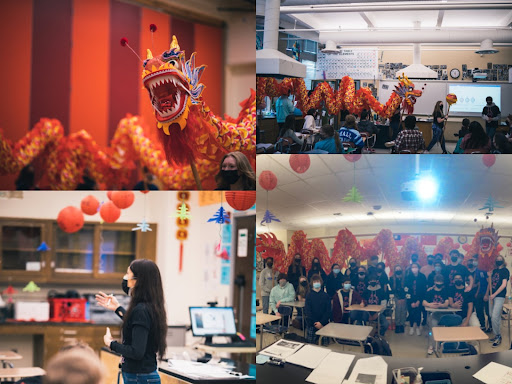The Dragon’s March
This year was the first year that Hall has hosted an official celebration for the Lunar New Year, also known as the Spring Festival.
Although many know Lunar New Year as Chinese New Years, it is celebrated by many other countries besides China such as Malaysia, the Philippines, Vietnam, Japan, South Korea, Singapore, Thailand, and Indonesia. It is based upon the Lunar calendar and is celebrated differently based on different cultures.
This year, the Chinese program at Hall hosted the Chinese New Year celebration to share this significant holiday with the school. The idea first came from Bhajan Deshpande, a current junior who takes Honors Chinese III. The goal was not only to introduce the history of Chinese New Year and how Chinese New Years is celebrated in China but also to provide an exciting interactive experience to the Hall community.
Before the dragon parade, a lot of preparation was made, especially by Hall’s Chinese teachers, Daisy Laone and Connie Xu, and the National Chinese Honors Society officers. Before the dragon marched, everyone agreed that a community lesson was needed to give background information to answer these questions: What is Chinese New Year? How is it celebrated?
So, what is Chinese New Year and how is it celebrated? Here is a refresher: There is a myth of a monster named Nian (“Nian” means “year” in Chinese). Nian terrorized people who lived in villages, but, one day, the villagers were told by a traveller that Nian was scared of loud sounds and the color red. So every year on Chinese New Year, people set off firecrackers and put up red Chun Lian to scare off Nian.
Other traditions on Chinese New Year are eating and reuniting with family, giving children red envelopes of money, eating dumplings (which are shaped like gold nuggets), and eating fish (in Chinese, fish is a homonym with surplus).
Why a dragon? In Chinese culture, dragons symbolize power, good luck, and strength. If you were lucky enough to see the dragon, then you will be blessed with good fortune for the coming year. If you didn’t see it this year, perhaps you can see it next year!
To prepare for the celebration, all students in the Chinese classes practiced the dragon dance. On the actual celebration day, students would rotate roles and perform in the gym, cafeteria, and classrooms to spread the luck.
After the dragon dance, the Asian Cultural Club, led by Tina Xu, Monica Wheeler, and Quinn Martin, held fundraisers after school where they sold popular Asian snacks such as ramen, boba, and Hello Panda.
It is safe to say that the celebration was a huge success. Could this be a new tradition at Hall? We all hope so, so don’t forget to keep an eye out for the dragon parade next year!






